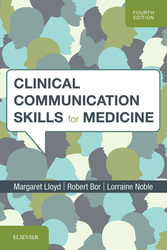「重要なお知らせ:日本語書籍をご購入いただき、eLibraryをご利用の皆さまへ」
エルゼビアは、より快適にサービスをご利用いただくため、システムの重要なアップ
デートを実施いたしました。
現在eLibraryで日本語電子書籍をご利用のお客様は、今後より高いアクセシビリティとセ
キュリティを備えた新しいプラットフォーム「eBooks+」へアカウントが移行されてい
ます。eBooks+のご利用については
こちらよりご利用・ご登録ください。
Book Description
Clinical Communication Skills for Medicine is an essential guide to the core skills for effective patient-centered communication. In the twenty years since this book was first published the teaching of these skills has developed and evolved. Today’s doctors fully appreciate the importance of communicating successfully and sensitively with people receiving health care and those close to them.
This practical guide to developing communication skills will be of value to students throughout their careers. The order of the chapters reflects this development, from core skills to those required to respond effectively and compassionately in challenging situations. The text includes case examples, guidelines and opportunities to encourage the reader to stop and think.
The contents of the book cover:
- The fundamental elements of clinical communication, including skills for effectively gathering and sharing information, discussing sensitive topics and breaking bad news.
- Shared decision making, reflecting the rapid changes in expectations of medical care and skills for supporting patients in making decisions which are right for them.
- Communicating with a patient’s family, children and young people, patients from different cultural backgrounds, communicating via an interpreter and communicating with patients who have a hearing impairment.
- Diversity in communication, including examples of communicating with patients who have a learning disability, transgender patients, and older adult patients.
- Communicating about medical error, emphasising the importance of doctors being honest in the face of difficult situations.
- This is a practical guide to learning and developing communication skills throughout medical training.
- The chapters range from the development of basic skills to those dealing with challenging and difficult situations.


 (0 rating)
(0 rating) 




